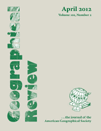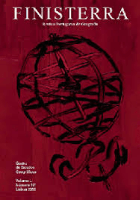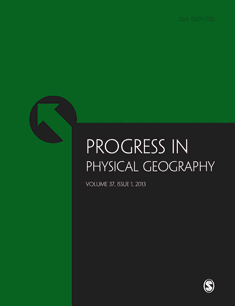
Journal of Geography-Chigaku Zasshi
Scope & Guideline
Navigating the Terrain of Knowledge in Geography
Introduction
Aims and Scopes
- Geosciences and Natural Hazards:
The journal focuses on geosciences, particularly in relation to natural hazards such as earthquakes, tsunamis, and volcanic activities. Research often includes geological assessments, risk evaluations, and disaster prevention strategies. - Environmental Changes and Management:
There is a significant emphasis on understanding environmental changes over time, including climate impacts, land use changes, and resource management strategies. This encompasses studies on ecosystems, hydrology, and pollution. - Geospatial Analysis and Remote Sensing:
The use of geospatial technologies and remote sensing plays a critical role in research, allowing for detailed analysis of geographical data, landforms, and environmental monitoring. - Cultural and Socioeconomic Geography:
The journal also addresses cultural and socioeconomic aspects of geography, exploring topics such as migration patterns, resource management, and community responses to environmental changes. - Paleogeography and Historical Geography:
Research in this area examines past geographical conditions and events, often linking geological findings to historical data to understand long-term environmental changes.
Trending and Emerging
- Disaster Risk Reduction and Resilience:
Recent issues have highlighted a growing focus on disaster risk reduction strategies, particularly in the context of natural disasters like earthquakes and tsunamis. This trend underscores the urgency of developing effective preparedness and response plans. - Climate Change Impacts:
There is a marked increase in studies addressing the impacts of climate change on geographical and environmental phenomena, emphasizing the need for adaptive management strategies in various sectors including agriculture and urban planning. - Interdisciplinary Approaches to Resource Management:
Emerging research emphasizes the integration of social sciences with natural sciences to address resource management challenges, reflecting a holistic view of environmental issues that includes human behavior and policy implications. - Technological Innovations in Geography:
The application of advanced technologies, such as machine learning and big data analytics, in geographic research is on the rise, facilitating more sophisticated analyses of spatial data and improving predictive modeling. - Sustainable Development and Urban Geography:
There is an increasing emphasis on sustainable development practices and urban geography, particularly in the context of managing urbanization and its environmental impacts.
Declining or Waning
- Traditional Mineralogy and Geochemistry:
Although mineralogy has been a significant focus, recent publications indicate a waning interest in traditional aspects of mineral studies, possibly overshadowed by more applied research in geochemistry and environmental sciences. - Historical Geoscience Studies:
Research centered on historical geoscience, while still relevant, has seen fewer contributions, likely as attention shifts to contemporary issues such as climate change and its immediate impacts on society and the environment. - Static Geological Mapping:
There appears to be a decline in publications focused solely on geological mapping without integrating modern technological approaches, such as GIS and remote sensing, which are increasingly favored in contemporary research.
Similar Journals

Journal of Geology Geography and Geoecology
Pioneering Research at the Intersection of Earth Sciences.The Journal of Geology Geography and Geoecology, published by OLES GONCHAR DNIPRO NATIONAL UNIVERSITY, is a premier open-access platform dedicated to advancing the fields of geology, geography, and geoecology. With its ISSN 2617-2909 and E-ISSN 2617-2119, this journal seeks to disseminate high-quality research, fostering collaboration and innovation among researchers, professionals, and students alike. The journal embraces a diverse range of topics, from earth sciences and ecological studies to geographical methodologies, providing a comprehensive perspective on how these disciplines interconnect. It aims to support impactful scholarly communication, thereby addressing some of the most pressing environmental challenges of our time. Authors and readers will find a committed editorial team that values rigorous peer-review processes and encourages the rapid sharing of scientific knowledge, all while maintaining a commitment to open access principles. This makes the Journal of Geology Geography and Geoecology an essential resource for anyone invested in understanding the complex dynamics of our planet.

Quaestiones Geographicae
Empowering Global Perspectives on Earth’s PhenomenaQuaestiones Geographicae, an esteemed open-access journal published by SCIENDO, serves as a vital platform for scholarly communication in the field of Earth and Planetary Sciences. Since its inception in 1979, the journal has been dedicated to promoting rigorous research and discourse in geography, encompassing a breadth of topics that reflect the dynamic nature of the discipline. With an impressive Impact Factor belonging to the Q3 quartile category, the journal actively contributes to the global scientific community's understanding of geographical phenomena. Its commitment to open-access publishing since 2010 ensures that groundbreaking research is accessible to a wider audience, facilitating collaboration and innovation. As part of its enduring legacy, Quaestiones Geographicae engages researchers, professionals, and students alike, inviting them to explore, share, and expand the boundaries of geographical knowledge.

Geographica Pannonica
Navigating the Frontiers of Geographical ResearchGeographica Pannonica is a premier, open-access journal dedicated to the various dimensions of geography, atmospheric sciences, geology, and related fields. Published by the University of Novi Sad's Faculty of Natural Sciences and Mathematics, this Serbian journal has been a vital platform for scholarly discourse since its inception, with an open-access policy established in 2010 to enhance the dissemination of research findings. Covering a spectrum of topics from Earth-surface processes to tourism management, the journal has achieved notable rankings, reflecting its commitment to impactful research—ranking in the Q3 quartile across multiple categories in 2023. Researchers, professionals, and students are encouraged to engage with the latest articles that contribute to advancing our understanding of geographical phenomena and sustainability challenges, making Geographica Pannonica an essential resource for the global academic community.

GEOGRAPHICAL REVIEW
Charting New Territories in Earth-Surface StudiesGEOGRAPHICAL REVIEW, published by Taylor & Francis Inc, is a premier academic journal recognized for its influential contributions to the fields of geography and earth-surface processes. With an ISSN of 0016-7428 and an E-ISSN of 1931-0846, this journal has established itself as a vital resource for researchers, professionals, and students alike. The journal maintains a strong reputation with a Q1 ranking in both Earth-Surface Processes and Geography, Planning and Development, reflecting its scholarly impact and relevance in the academic community. Additionally, it holds a notable position in Scopus rankings, placing #181 out of 821 in Social Sciences and #45 out of 179 in Earth and Planetary Sciences. Although it is not open access, the GEOGRAPHICAL REVIEW remains essential for those seeking to expand their understanding of spatial analysis and environmental processes from its historical inception in 1969 to its ongoing publications through 2024. Explore rigorous research articles, critical reviews, and innovative studies that shape the discourse in geography and earth sciences today.

Revista Geografica de America Central
Fostering Innovative Research in Central America.Revista Geografica de America Central is a distinguished scholarly journal published by the UNIV NACL, ESCUELA CIENCIAS GEOGRAFICAS, focusing on the dynamic field of geography, particularly within Central America. Since its inception in 1974, the journal has championed the dissemination of open-access research, fostering collaboration and innovation among researchers, professionals, and students alike. With an evolving scope that reflects the region's rich geographical diversity, this journal serves as a vital platform for sharing empirical studies, theoretical advancements, and methodological discussions that enhance our understanding of Central America's unique environmental and socio-economic challenges. Although it has experienced various coverage periods, the journal remains committed to advancing geographic scholarship and supporting open academic discourse. Its open-access model ensures that essential knowledge is readily available to an expanding global audience, making it an invaluable resource in the field.

Boletim de Ciencias Geodesicas
Empowering the Geoscience Community with Open Access FindingsBoletim de Ciências Geodésicas is an esteemed academic journal published by the Universidade Federal do Paraná within its Centro Politécnico. Focused on the dynamic field of Earth and Planetary Sciences, this Open Access journal has been a pivotal resource since 1997, fostering the dissemination of critical research and innovative methodologies. With an impact factor indicative of its relevance in the discipline, Boletim de Ciências Geodésicas ranks in the Q3 quartile for Earth and Planetary Sciences as of 2023, showcasing its commitment to quality scholarship in a competitive field. Researchers and students alike will benefit from access to cutting-edge findings, given its broad scope that encompasses various aspects of geodesy and related sciences. The journal's convergence of research from 2005 to 2024 ensures that it remains at the forefront of emerging trends and fundamental developments in the discipline, further enhancing its esteemed reputation in the academic community.

GEOGRAFICKY CASOPIS-Geographical Journal
Exploring the dynamic relationship between earth and society.GEOGRAFICKY CASOPIS-Geographical Journal is a prestigious publication dedicated to advancing knowledge in the fields of geography and earth sciences, published by the SLOVAK ACADEMY OF SCIENCES, INSTITUTE OF GEOGRAPHY. With a rich history dating back to its inception in 1976, the journal serves as a vital forum for researchers and professionals to disseminate their findings across a range of topics including earth-surface processes, geography, planning, development, and geology. Notably, it maintains a respectable Q3 category ranking across these disciplines as of 2023, indicating its contribution to relevant academic discourse. The journal is indexed under critical databases and engages a global audience, making it an essential resource for scholars seeking to stay informed about contemporary issues and advancements in geography. Although currently not an open-access journal, it emphasizes the sharing of significant research findings and encourages submissions from various geographical contexts to enrich the scientific community. Geographical Journal's commitment to fostering interdisciplinary dialogue ensures its relevance and importance in shaping the future of geographical research.

Finisterra-Revista Portuguesa de Geografia
Advancing Interdisciplinary Dialogue in GeographyFinisterra-Revista Portuguesa de Geografia is a distinguished academic journal published by the Centro de Estudos Geográficos, Universidade de Lisboa, since 1978, presenting a vital platform for research in the fields of Geography, Earth and Planetary Sciences. The journal operates under an Open Access model, encouraging broad dissemination of knowledge and ensuring that research is accessible to all, a commitment it has upheld since 2004. With a notable Q3 ranking in both Earth and Planetary Sciences (miscellaneous) and Geography, Planning and Development as of 2023, it serves as a significant conduit for scholarly discourse in these domains. The journal's scope reflects a diverse array of geographical studies, promoting interdisciplinary dialogue and research innovations, while its strategic publication history showcases its adaptability and relevance to contemporary issues. Researchers, professionals, and students alike are invited to engage with this pivotal resource that continues to shape geographical scholarship in Portugal and beyond.

All Earth
Championing Open Access to Earth Science InsightsAll Earth is an esteemed open-access journal published by Taylor & Francis Ltd, dedicated to multidisciplinary research in the fields of Earth and Planetary Sciences, Global and Planetary Change, as well as Management, Monitoring, Policy, and Law. Since its inception in 2021, All Earth has swiftly positioned itself in the academic community, achieving notable rankings such as Q2 in Earth and Planetary Sciences and Q3 in related fields, showcasing its commitment to high-quality interdisciplinary scholarship. Researchers and professionals can benefit from its accessible content, which contributes to the ongoing discourse on critical environmental issues and innovative solutions for sustainable development. The journal is based in the United Kingdom and continues to be a vital source of information and inspiration for students and scholars aiming to tackle the pressing challenges of our planet through rigorous scientific inquiry and policy analysis.

Progress in Physical Geography-Earth and Environment
Leading the way in innovative research and methodologies.Progress in Physical Geography-Earth and Environment is a premier academic journal published by SAGE Publications Ltd, renowned for its contributions to the fields of Earth and Planetary Sciences and Geography. With a distinguished history spanning from 1977 to 2024, this journal maintains a robust Q1 classification in both Earth and Planetary Sciences and Geography, Planning and Development, reflecting its high impact and rigorous scholarly standards. As evidenced by its Scopus rankings, it stands at the forefront of research, positioned in the 89th percentile among leading journals. Progress in Physical Geography aims to facilitate the exchange of innovative research, insights, and methodologies, making it an essential resource for researchers, professionals, and students dedicated to understanding and shaping the natural environment. While currently not designated as an Open Access journal, the wide accessibility of its content, combined with its significant impact factor, underscores its importance within the academic community seeking to advance knowledge and application in geography and environmental sciences.